Report: Environmental Management for Sustainable Development
VerifiedAdded on 2020/01/28
|8
|2684
|47
Report
AI Summary
This report delves into the critical aspects of environmental management for sustainable development, focusing on global warming, climate change, and the role of renewable energy sources. It examines the negative impacts of climate change, emphasizing the increase in global temperatures and carbon emissions, and the subsequent effects on ecosystems and biodiversity. The report also analyzes the UK's energy schemes, particularly the Renewable Obligation Certificate (ROC) and the Energy Company Obligation (ECO), and their influence on oil and gas companies. It explores the advantages and disadvantages of biomass energy systems, highlighting their environmental benefits, such as reduced carbon emissions, alongside the space requirements. Furthermore, the report provides recommendations, including the implementation of the Kyoto Protocol and the use of carbon sinks, to mitigate the effects of global warming and promote sustainable practices. The conclusion stresses the importance of governmental actions in conserving natural resources and achieving environmental sustainability.
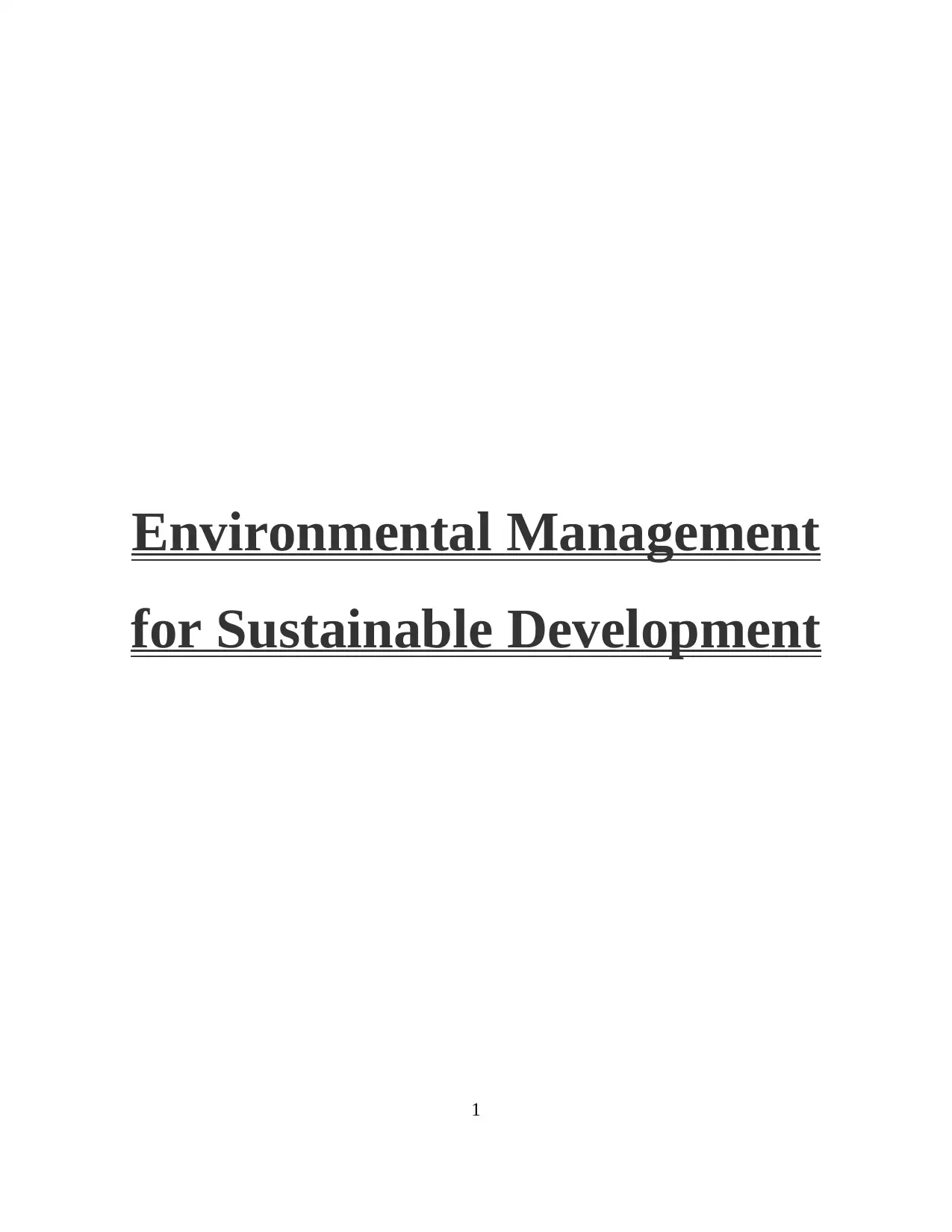
Environmental Management
for Sustainable Development
1
for Sustainable Development
1
Paraphrase This Document
Need a fresh take? Get an instant paraphrase of this document with our AI Paraphraser
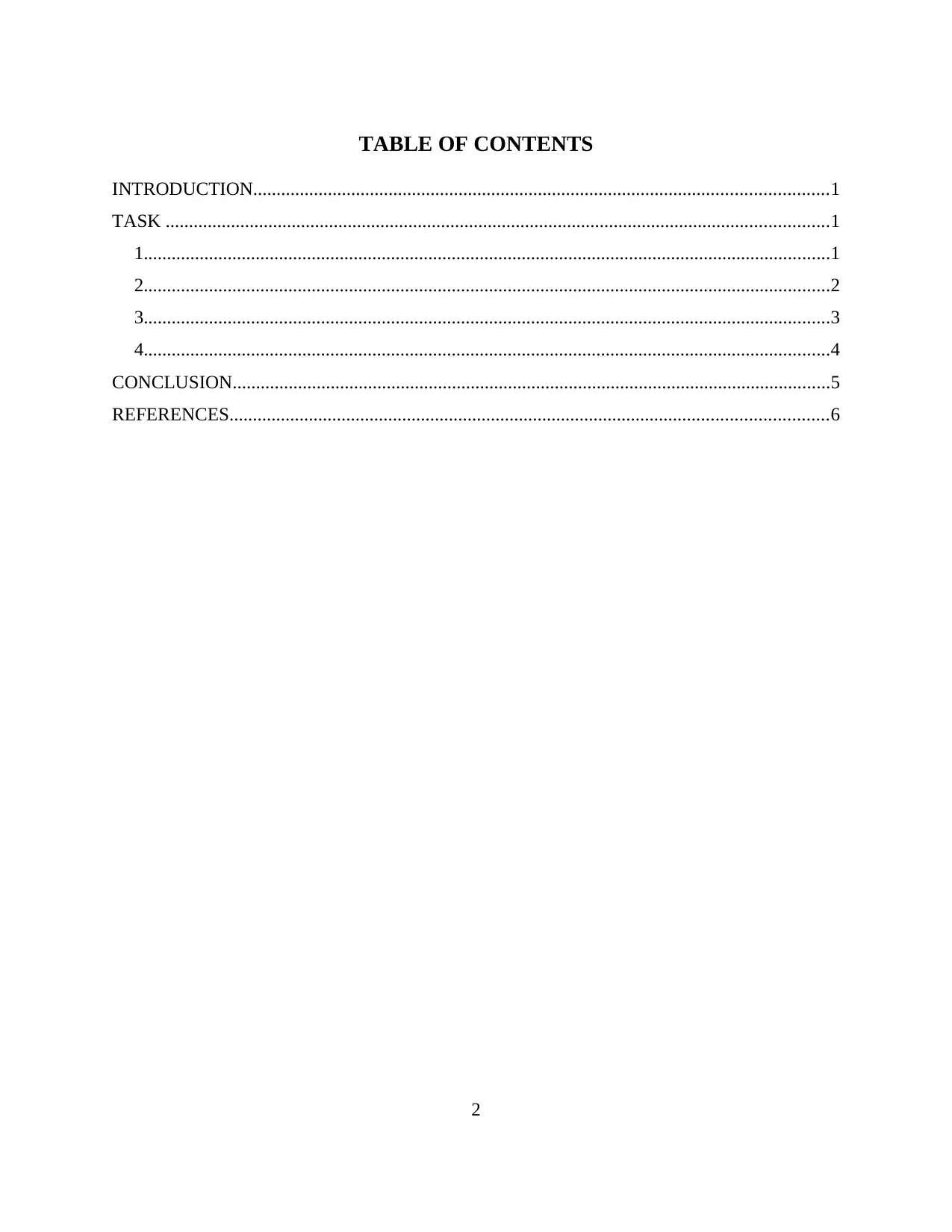
TABLE OF CONTENTS
INTRODUCTION...........................................................................................................................1
TASK ..............................................................................................................................................1
1...................................................................................................................................................1
2...................................................................................................................................................2
3...................................................................................................................................................3
4...................................................................................................................................................4
CONCLUSION................................................................................................................................5
REFERENCES................................................................................................................................6
2
INTRODUCTION...........................................................................................................................1
TASK ..............................................................................................................................................1
1...................................................................................................................................................1
2...................................................................................................................................................2
3...................................................................................................................................................3
4...................................................................................................................................................4
CONCLUSION................................................................................................................................5
REFERENCES................................................................................................................................6
2
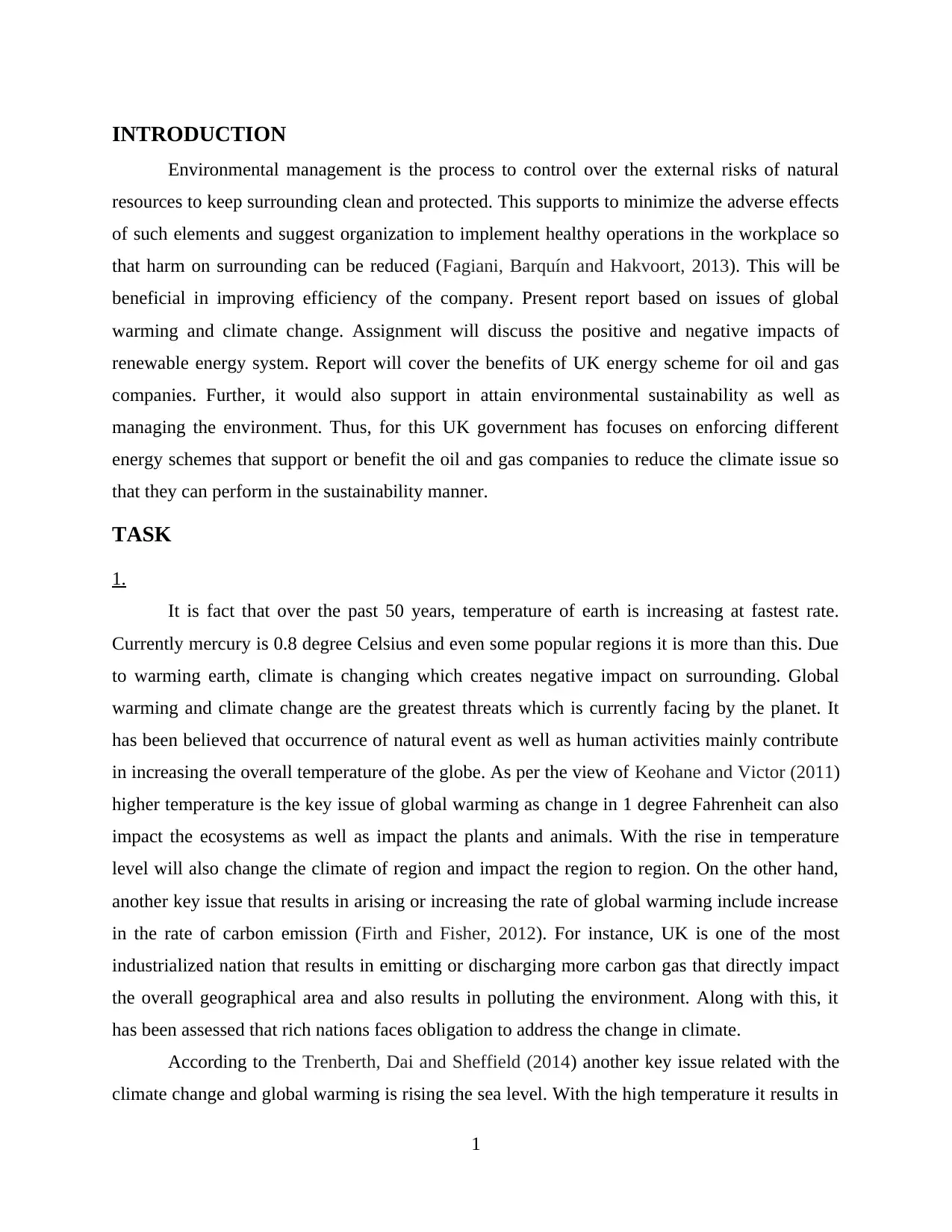
INTRODUCTION
Environmental management is the process to control over the external risks of natural
resources to keep surrounding clean and protected. This supports to minimize the adverse effects
of such elements and suggest organization to implement healthy operations in the workplace so
that harm on surrounding can be reduced (Fagiani, Barquín and Hakvoort, 2013). This will be
beneficial in improving efficiency of the company. Present report based on issues of global
warming and climate change. Assignment will discuss the positive and negative impacts of
renewable energy system. Report will cover the benefits of UK energy scheme for oil and gas
companies. Further, it would also support in attain environmental sustainability as well as
managing the environment. Thus, for this UK government has focuses on enforcing different
energy schemes that support or benefit the oil and gas companies to reduce the climate issue so
that they can perform in the sustainability manner.
TASK
1.
It is fact that over the past 50 years, temperature of earth is increasing at fastest rate.
Currently mercury is 0.8 degree Celsius and even some popular regions it is more than this. Due
to warming earth, climate is changing which creates negative impact on surrounding. Global
warming and climate change are the greatest threats which is currently facing by the planet. It
has been believed that occurrence of natural event as well as human activities mainly contribute
in increasing the overall temperature of the globe. As per the view of Keohane and Victor (2011)
higher temperature is the key issue of global warming as change in 1 degree Fahrenheit can also
impact the ecosystems as well as impact the plants and animals. With the rise in temperature
level will also change the climate of region and impact the region to region. On the other hand,
another key issue that results in arising or increasing the rate of global warming include increase
in the rate of carbon emission (Firth and Fisher, 2012). For instance, UK is one of the most
industrialized nation that results in emitting or discharging more carbon gas that directly impact
the overall geographical area and also results in polluting the environment. Along with this, it
has been assessed that rich nations faces obligation to address the change in climate.
According to the Trenberth, Dai and Sheffield (2014) another key issue related with the
climate change and global warming is rising the sea level. With the high temperature it results in
1
Environmental management is the process to control over the external risks of natural
resources to keep surrounding clean and protected. This supports to minimize the adverse effects
of such elements and suggest organization to implement healthy operations in the workplace so
that harm on surrounding can be reduced (Fagiani, Barquín and Hakvoort, 2013). This will be
beneficial in improving efficiency of the company. Present report based on issues of global
warming and climate change. Assignment will discuss the positive and negative impacts of
renewable energy system. Report will cover the benefits of UK energy scheme for oil and gas
companies. Further, it would also support in attain environmental sustainability as well as
managing the environment. Thus, for this UK government has focuses on enforcing different
energy schemes that support or benefit the oil and gas companies to reduce the climate issue so
that they can perform in the sustainability manner.
TASK
1.
It is fact that over the past 50 years, temperature of earth is increasing at fastest rate.
Currently mercury is 0.8 degree Celsius and even some popular regions it is more than this. Due
to warming earth, climate is changing which creates negative impact on surrounding. Global
warming and climate change are the greatest threats which is currently facing by the planet. It
has been believed that occurrence of natural event as well as human activities mainly contribute
in increasing the overall temperature of the globe. As per the view of Keohane and Victor (2011)
higher temperature is the key issue of global warming as change in 1 degree Fahrenheit can also
impact the ecosystems as well as impact the plants and animals. With the rise in temperature
level will also change the climate of region and impact the region to region. On the other hand,
another key issue that results in arising or increasing the rate of global warming include increase
in the rate of carbon emission (Firth and Fisher, 2012). For instance, UK is one of the most
industrialized nation that results in emitting or discharging more carbon gas that directly impact
the overall geographical area and also results in polluting the environment. Along with this, it
has been assessed that rich nations faces obligation to address the change in climate.
According to the Trenberth, Dai and Sheffield (2014) another key issue related with the
climate change and global warming is rising the sea level. With the high temperature it results in
1
⊘ This is a preview!⊘
Do you want full access?
Subscribe today to unlock all pages.

Trusted by 1+ million students worldwide
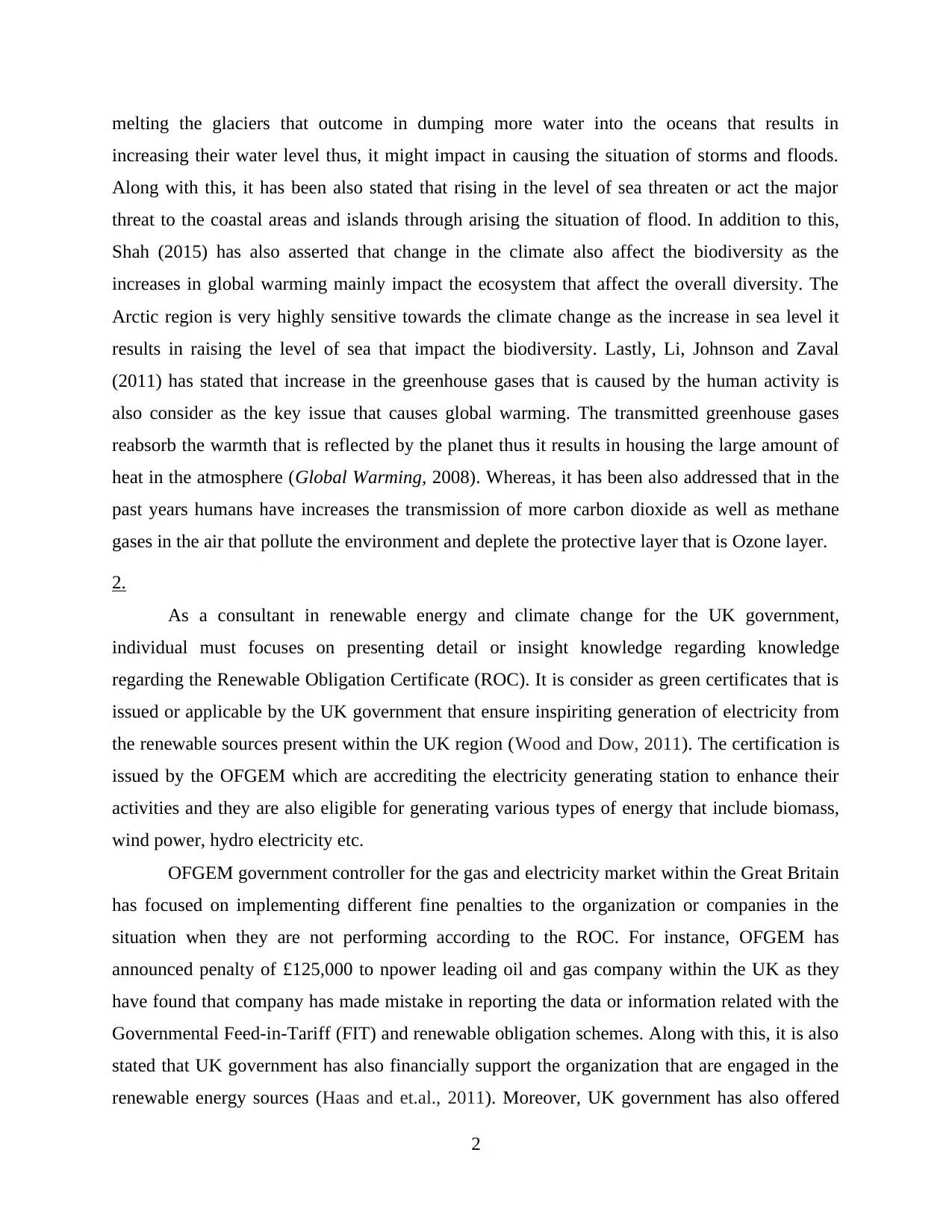
melting the glaciers that outcome in dumping more water into the oceans that results in
increasing their water level thus, it might impact in causing the situation of storms and floods.
Along with this, it has been also stated that rising in the level of sea threaten or act the major
threat to the coastal areas and islands through arising the situation of flood. In addition to this,
Shah (2015) has also asserted that change in the climate also affect the biodiversity as the
increases in global warming mainly impact the ecosystem that affect the overall diversity. The
Arctic region is very highly sensitive towards the climate change as the increase in sea level it
results in raising the level of sea that impact the biodiversity. Lastly, Li, Johnson and Zaval
(2011) has stated that increase in the greenhouse gases that is caused by the human activity is
also consider as the key issue that causes global warming. The transmitted greenhouse gases
reabsorb the warmth that is reflected by the planet thus it results in housing the large amount of
heat in the atmosphere (Global Warming, 2008). Whereas, it has been also addressed that in the
past years humans have increases the transmission of more carbon dioxide as well as methane
gases in the air that pollute the environment and deplete the protective layer that is Ozone layer.
2.
As a consultant in renewable energy and climate change for the UK government,
individual must focuses on presenting detail or insight knowledge regarding knowledge
regarding the Renewable Obligation Certificate (ROC). It is consider as green certificates that is
issued or applicable by the UK government that ensure inspiriting generation of electricity from
the renewable sources present within the UK region (Wood and Dow, 2011). The certification is
issued by the OFGEM which are accrediting the electricity generating station to enhance their
activities and they are also eligible for generating various types of energy that include biomass,
wind power, hydro electricity etc.
OFGEM government controller for the gas and electricity market within the Great Britain
has focused on implementing different fine penalties to the organization or companies in the
situation when they are not performing according to the ROC. For instance, OFGEM has
announced penalty of £125,000 to npower leading oil and gas company within the UK as they
have found that company has made mistake in reporting the data or information related with the
Governmental Feed-in-Tariff (FIT) and renewable obligation schemes. Along with this, it is also
stated that UK government has also financially support the organization that are engaged in the
renewable energy sources (Haas and et.al., 2011). Moreover, UK government has also offered
2
increasing their water level thus, it might impact in causing the situation of storms and floods.
Along with this, it has been also stated that rising in the level of sea threaten or act the major
threat to the coastal areas and islands through arising the situation of flood. In addition to this,
Shah (2015) has also asserted that change in the climate also affect the biodiversity as the
increases in global warming mainly impact the ecosystem that affect the overall diversity. The
Arctic region is very highly sensitive towards the climate change as the increase in sea level it
results in raising the level of sea that impact the biodiversity. Lastly, Li, Johnson and Zaval
(2011) has stated that increase in the greenhouse gases that is caused by the human activity is
also consider as the key issue that causes global warming. The transmitted greenhouse gases
reabsorb the warmth that is reflected by the planet thus it results in housing the large amount of
heat in the atmosphere (Global Warming, 2008). Whereas, it has been also addressed that in the
past years humans have increases the transmission of more carbon dioxide as well as methane
gases in the air that pollute the environment and deplete the protective layer that is Ozone layer.
2.
As a consultant in renewable energy and climate change for the UK government,
individual must focuses on presenting detail or insight knowledge regarding knowledge
regarding the Renewable Obligation Certificate (ROC). It is consider as green certificates that is
issued or applicable by the UK government that ensure inspiriting generation of electricity from
the renewable sources present within the UK region (Wood and Dow, 2011). The certification is
issued by the OFGEM which are accrediting the electricity generating station to enhance their
activities and they are also eligible for generating various types of energy that include biomass,
wind power, hydro electricity etc.
OFGEM government controller for the gas and electricity market within the Great Britain
has focused on implementing different fine penalties to the organization or companies in the
situation when they are not performing according to the ROC. For instance, OFGEM has
announced penalty of £125,000 to npower leading oil and gas company within the UK as they
have found that company has made mistake in reporting the data or information related with the
Governmental Feed-in-Tariff (FIT) and renewable obligation schemes. Along with this, it is also
stated that UK government has also financially support the organization that are engaged in the
renewable energy sources (Haas and et.al., 2011). Moreover, UK government has also offered
2
Paraphrase This Document
Need a fresh take? Get an instant paraphrase of this document with our AI Paraphraser
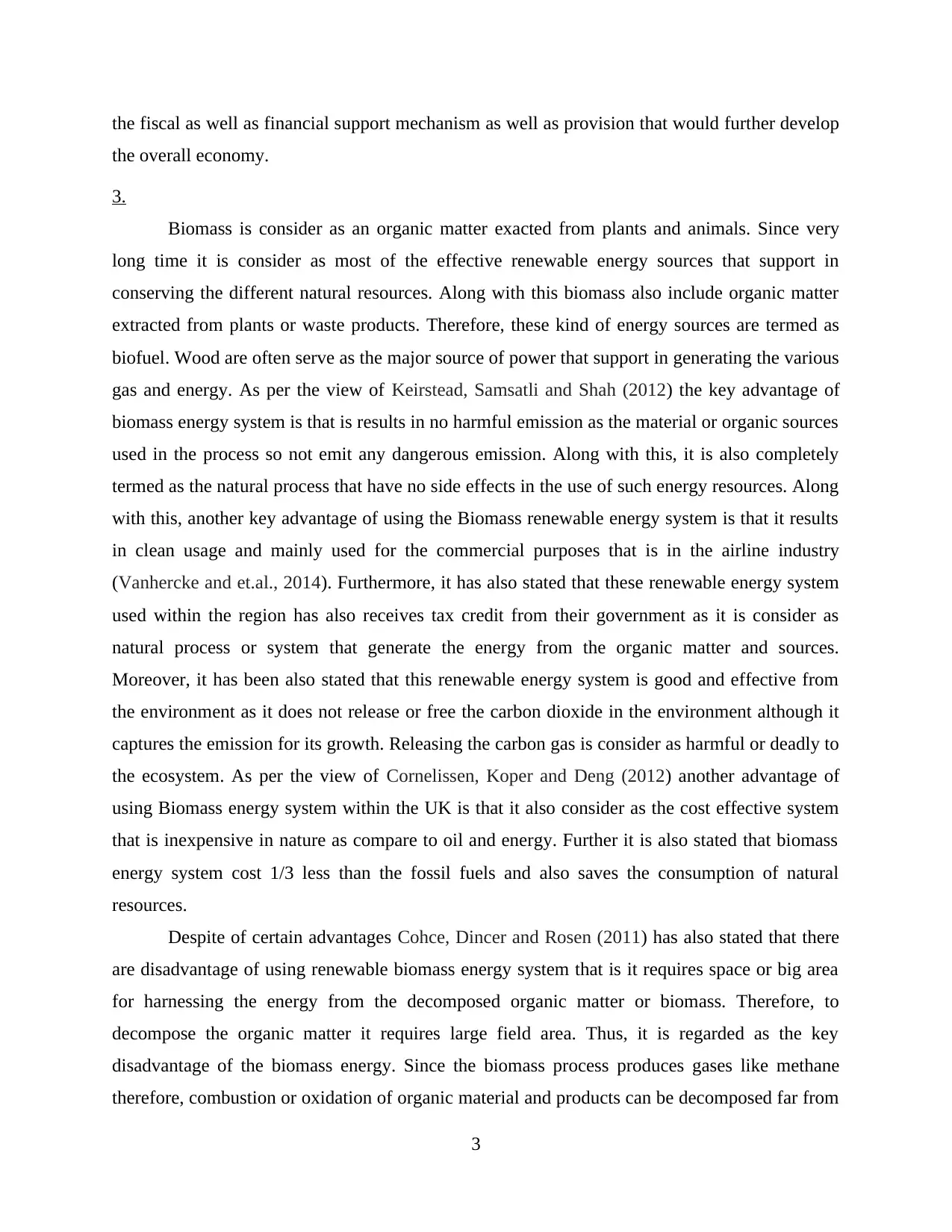
the fiscal as well as financial support mechanism as well as provision that would further develop
the overall economy.
3.
Biomass is consider as an organic matter exacted from plants and animals. Since very
long time it is consider as most of the effective renewable energy sources that support in
conserving the different natural resources. Along with this biomass also include organic matter
extracted from plants or waste products. Therefore, these kind of energy sources are termed as
biofuel. Wood are often serve as the major source of power that support in generating the various
gas and energy. As per the view of Keirstead, Samsatli and Shah (2012) the key advantage of
biomass energy system is that is results in no harmful emission as the material or organic sources
used in the process so not emit any dangerous emission. Along with this, it is also completely
termed as the natural process that have no side effects in the use of such energy resources. Along
with this, another key advantage of using the Biomass renewable energy system is that it results
in clean usage and mainly used for the commercial purposes that is in the airline industry
(Vanhercke and et.al., 2014). Furthermore, it has also stated that these renewable energy system
used within the region has also receives tax credit from their government as it is consider as
natural process or system that generate the energy from the organic matter and sources.
Moreover, it has been also stated that this renewable energy system is good and effective from
the environment as it does not release or free the carbon dioxide in the environment although it
captures the emission for its growth. Releasing the carbon gas is consider as harmful or deadly to
the ecosystem. As per the view of Cornelissen, Koper and Deng (2012) another advantage of
using Biomass energy system within the UK is that it also consider as the cost effective system
that is inexpensive in nature as compare to oil and energy. Further it is also stated that biomass
energy system cost 1/3 less than the fossil fuels and also saves the consumption of natural
resources.
Despite of certain advantages Cohce, Dincer and Rosen (2011) has also stated that there
are disadvantage of using renewable biomass energy system that is it requires space or big area
for harnessing the energy from the decomposed organic matter or biomass. Therefore, to
decompose the organic matter it requires large field area. Thus, it is regarded as the key
disadvantage of the biomass energy. Since the biomass process produces gases like methane
therefore, combustion or oxidation of organic material and products can be decomposed far from
3
the overall economy.
3.
Biomass is consider as an organic matter exacted from plants and animals. Since very
long time it is consider as most of the effective renewable energy sources that support in
conserving the different natural resources. Along with this biomass also include organic matter
extracted from plants or waste products. Therefore, these kind of energy sources are termed as
biofuel. Wood are often serve as the major source of power that support in generating the various
gas and energy. As per the view of Keirstead, Samsatli and Shah (2012) the key advantage of
biomass energy system is that is results in no harmful emission as the material or organic sources
used in the process so not emit any dangerous emission. Along with this, it is also completely
termed as the natural process that have no side effects in the use of such energy resources. Along
with this, another key advantage of using the Biomass renewable energy system is that it results
in clean usage and mainly used for the commercial purposes that is in the airline industry
(Vanhercke and et.al., 2014). Furthermore, it has also stated that these renewable energy system
used within the region has also receives tax credit from their government as it is consider as
natural process or system that generate the energy from the organic matter and sources.
Moreover, it has been also stated that this renewable energy system is good and effective from
the environment as it does not release or free the carbon dioxide in the environment although it
captures the emission for its growth. Releasing the carbon gas is consider as harmful or deadly to
the ecosystem. As per the view of Cornelissen, Koper and Deng (2012) another advantage of
using Biomass energy system within the UK is that it also consider as the cost effective system
that is inexpensive in nature as compare to oil and energy. Further it is also stated that biomass
energy system cost 1/3 less than the fossil fuels and also saves the consumption of natural
resources.
Despite of certain advantages Cohce, Dincer and Rosen (2011) has also stated that there
are disadvantage of using renewable biomass energy system that is it requires space or big area
for harnessing the energy from the decomposed organic matter or biomass. Therefore, to
decompose the organic matter it requires large field area. Thus, it is regarded as the key
disadvantage of the biomass energy. Since the biomass process produces gases like methane
therefore, combustion or oxidation of organic material and products can be decomposed far from
3
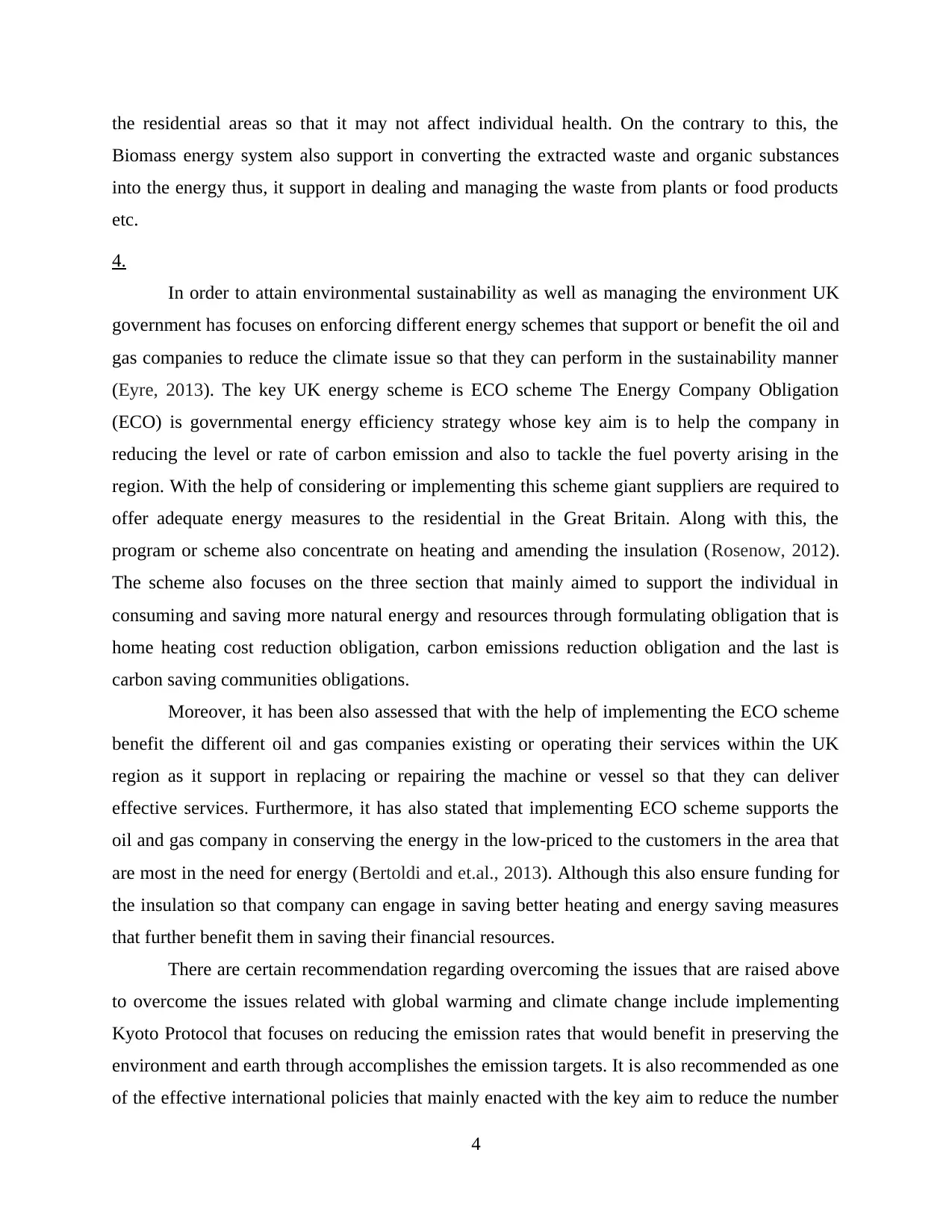
the residential areas so that it may not affect individual health. On the contrary to this, the
Biomass energy system also support in converting the extracted waste and organic substances
into the energy thus, it support in dealing and managing the waste from plants or food products
etc.
4.
In order to attain environmental sustainability as well as managing the environment UK
government has focuses on enforcing different energy schemes that support or benefit the oil and
gas companies to reduce the climate issue so that they can perform in the sustainability manner
(Eyre, 2013). The key UK energy scheme is ECO scheme The Energy Company Obligation
(ECO) is governmental energy efficiency strategy whose key aim is to help the company in
reducing the level or rate of carbon emission and also to tackle the fuel poverty arising in the
region. With the help of considering or implementing this scheme giant suppliers are required to
offer adequate energy measures to the residential in the Great Britain. Along with this, the
program or scheme also concentrate on heating and amending the insulation (Rosenow, 2012).
The scheme also focuses on the three section that mainly aimed to support the individual in
consuming and saving more natural energy and resources through formulating obligation that is
home heating cost reduction obligation, carbon emissions reduction obligation and the last is
carbon saving communities obligations.
Moreover, it has been also assessed that with the help of implementing the ECO scheme
benefit the different oil and gas companies existing or operating their services within the UK
region as it support in replacing or repairing the machine or vessel so that they can deliver
effective services. Furthermore, it has also stated that implementing ECO scheme supports the
oil and gas company in conserving the energy in the low-priced to the customers in the area that
are most in the need for energy (Bertoldi and et.al., 2013). Although this also ensure funding for
the insulation so that company can engage in saving better heating and energy saving measures
that further benefit them in saving their financial resources.
There are certain recommendation regarding overcoming the issues that are raised above
to overcome the issues related with global warming and climate change include implementing
Kyoto Protocol that focuses on reducing the emission rates that would benefit in preserving the
environment and earth through accomplishes the emission targets. It is also recommended as one
of the effective international policies that mainly enacted with the key aim to reduce the number
4
Biomass energy system also support in converting the extracted waste and organic substances
into the energy thus, it support in dealing and managing the waste from plants or food products
etc.
4.
In order to attain environmental sustainability as well as managing the environment UK
government has focuses on enforcing different energy schemes that support or benefit the oil and
gas companies to reduce the climate issue so that they can perform in the sustainability manner
(Eyre, 2013). The key UK energy scheme is ECO scheme The Energy Company Obligation
(ECO) is governmental energy efficiency strategy whose key aim is to help the company in
reducing the level or rate of carbon emission and also to tackle the fuel poverty arising in the
region. With the help of considering or implementing this scheme giant suppliers are required to
offer adequate energy measures to the residential in the Great Britain. Along with this, the
program or scheme also concentrate on heating and amending the insulation (Rosenow, 2012).
The scheme also focuses on the three section that mainly aimed to support the individual in
consuming and saving more natural energy and resources through formulating obligation that is
home heating cost reduction obligation, carbon emissions reduction obligation and the last is
carbon saving communities obligations.
Moreover, it has been also assessed that with the help of implementing the ECO scheme
benefit the different oil and gas companies existing or operating their services within the UK
region as it support in replacing or repairing the machine or vessel so that they can deliver
effective services. Furthermore, it has also stated that implementing ECO scheme supports the
oil and gas company in conserving the energy in the low-priced to the customers in the area that
are most in the need for energy (Bertoldi and et.al., 2013). Although this also ensure funding for
the insulation so that company can engage in saving better heating and energy saving measures
that further benefit them in saving their financial resources.
There are certain recommendation regarding overcoming the issues that are raised above
to overcome the issues related with global warming and climate change include implementing
Kyoto Protocol that focuses on reducing the emission rates that would benefit in preserving the
environment and earth through accomplishes the emission targets. It is also recommended as one
of the effective international policies that mainly enacted with the key aim to reduce the number
4
⊘ This is a preview!⊘
Do you want full access?
Subscribe today to unlock all pages.

Trusted by 1+ million students worldwide
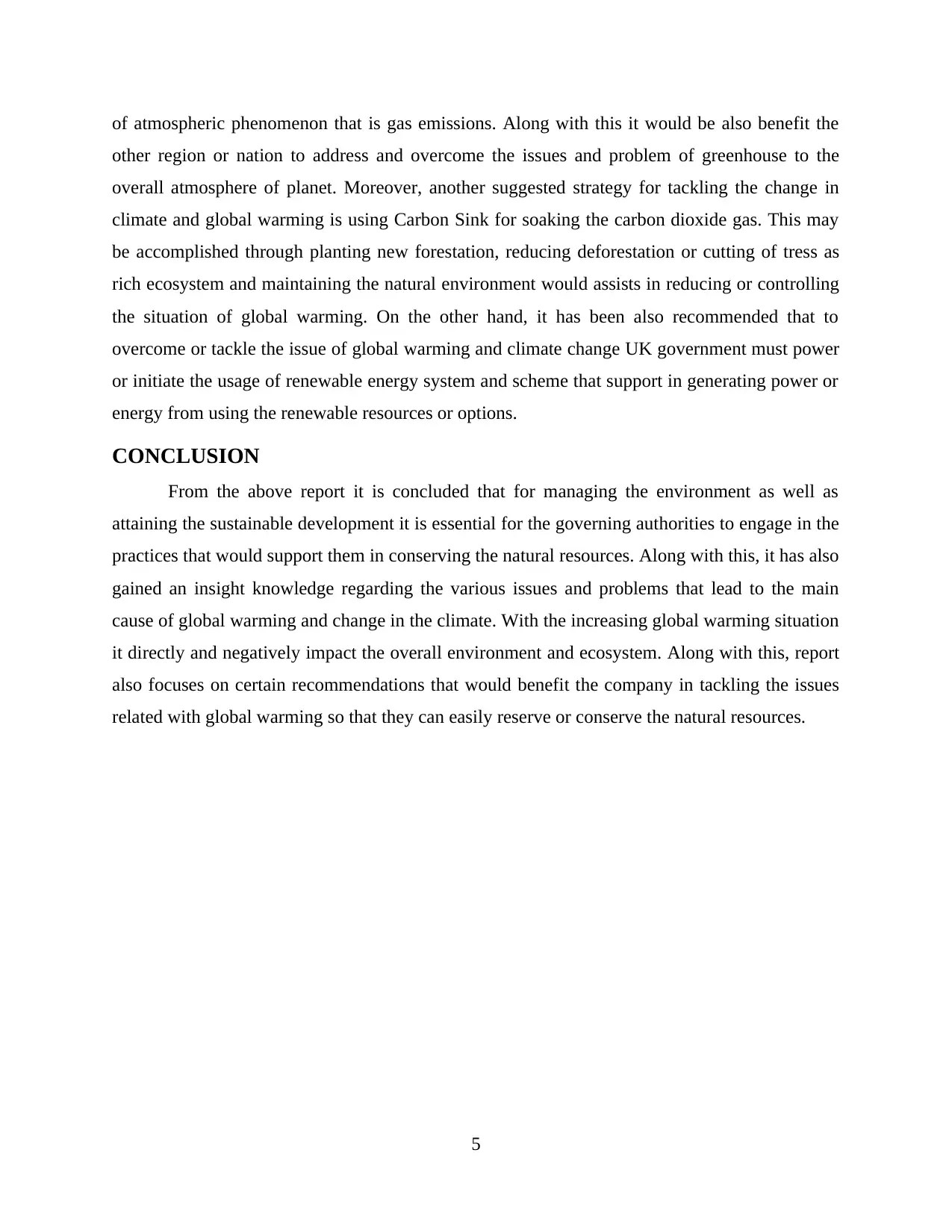
of atmospheric phenomenon that is gas emissions. Along with this it would be also benefit the
other region or nation to address and overcome the issues and problem of greenhouse to the
overall atmosphere of planet. Moreover, another suggested strategy for tackling the change in
climate and global warming is using Carbon Sink for soaking the carbon dioxide gas. This may
be accomplished through planting new forestation, reducing deforestation or cutting of tress as
rich ecosystem and maintaining the natural environment would assists in reducing or controlling
the situation of global warming. On the other hand, it has been also recommended that to
overcome or tackle the issue of global warming and climate change UK government must power
or initiate the usage of renewable energy system and scheme that support in generating power or
energy from using the renewable resources or options.
CONCLUSION
From the above report it is concluded that for managing the environment as well as
attaining the sustainable development it is essential for the governing authorities to engage in the
practices that would support them in conserving the natural resources. Along with this, it has also
gained an insight knowledge regarding the various issues and problems that lead to the main
cause of global warming and change in the climate. With the increasing global warming situation
it directly and negatively impact the overall environment and ecosystem. Along with this, report
also focuses on certain recommendations that would benefit the company in tackling the issues
related with global warming so that they can easily reserve or conserve the natural resources.
5
other region or nation to address and overcome the issues and problem of greenhouse to the
overall atmosphere of planet. Moreover, another suggested strategy for tackling the change in
climate and global warming is using Carbon Sink for soaking the carbon dioxide gas. This may
be accomplished through planting new forestation, reducing deforestation or cutting of tress as
rich ecosystem and maintaining the natural environment would assists in reducing or controlling
the situation of global warming. On the other hand, it has been also recommended that to
overcome or tackle the issue of global warming and climate change UK government must power
or initiate the usage of renewable energy system and scheme that support in generating power or
energy from using the renewable resources or options.
CONCLUSION
From the above report it is concluded that for managing the environment as well as
attaining the sustainable development it is essential for the governing authorities to engage in the
practices that would support them in conserving the natural resources. Along with this, it has also
gained an insight knowledge regarding the various issues and problems that lead to the main
cause of global warming and change in the climate. With the increasing global warming situation
it directly and negatively impact the overall environment and ecosystem. Along with this, report
also focuses on certain recommendations that would benefit the company in tackling the issues
related with global warming so that they can easily reserve or conserve the natural resources.
5
Paraphrase This Document
Need a fresh take? Get an instant paraphrase of this document with our AI Paraphraser
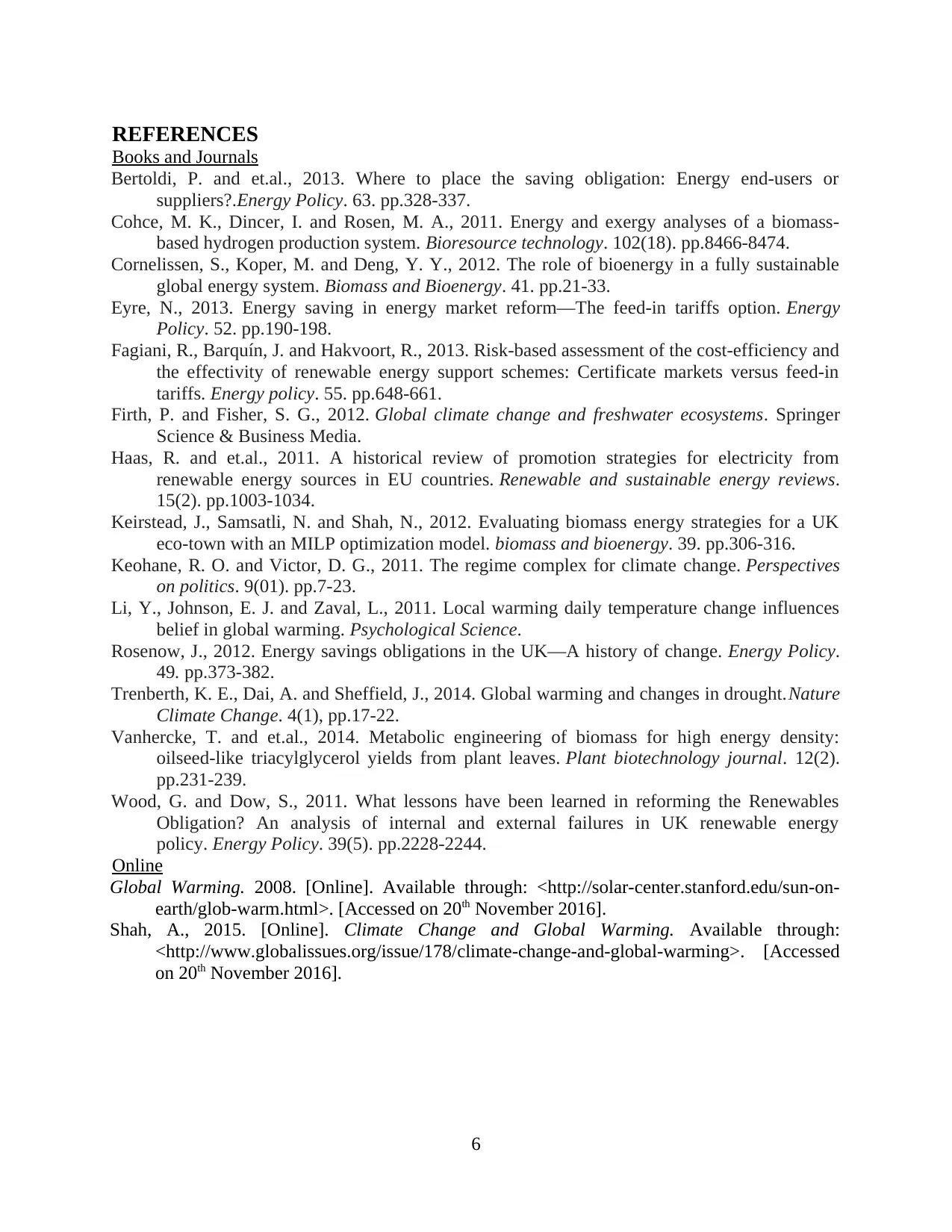
REFERENCES
Books and Journals
Bertoldi, P. and et.al., 2013. Where to place the saving obligation: Energy end-users or
suppliers?.Energy Policy. 63. pp.328-337.
Cohce, M. K., Dincer, I. and Rosen, M. A., 2011. Energy and exergy analyses of a biomass-
based hydrogen production system. Bioresource technology. 102(18). pp.8466-8474.
Cornelissen, S., Koper, M. and Deng, Y. Y., 2012. The role of bioenergy in a fully sustainable
global energy system. Biomass and Bioenergy. 41. pp.21-33.
Eyre, N., 2013. Energy saving in energy market reform—The feed-in tariffs option. Energy
Policy. 52. pp.190-198.
Fagiani, R., Barquín, J. and Hakvoort, R., 2013. Risk-based assessment of the cost-efficiency and
the effectivity of renewable energy support schemes: Certificate markets versus feed-in
tariffs. Energy policy. 55. pp.648-661.
Firth, P. and Fisher, S. G., 2012. Global climate change and freshwater ecosystems. Springer
Science & Business Media.
Haas, R. and et.al., 2011. A historical review of promotion strategies for electricity from
renewable energy sources in EU countries. Renewable and sustainable energy reviews.
15(2). pp.1003-1034.
Keirstead, J., Samsatli, N. and Shah, N., 2012. Evaluating biomass energy strategies for a UK
eco-town with an MILP optimization model. biomass and bioenergy. 39. pp.306-316.
Keohane, R. O. and Victor, D. G., 2011. The regime complex for climate change. Perspectives
on politics. 9(01). pp.7-23.
Li, Y., Johnson, E. J. and Zaval, L., 2011. Local warming daily temperature change influences
belief in global warming. Psychological Science.
Rosenow, J., 2012. Energy savings obligations in the UK—A history of change. Energy Policy.
49. pp.373-382.
Trenberth, K. E., Dai, A. and Sheffield, J., 2014. Global warming and changes in drought.Nature
Climate Change. 4(1), pp.17-22.
Vanhercke, T. and et.al., 2014. Metabolic engineering of biomass for high energy density:
oilseed‐like triacylglycerol yields from plant leaves. Plant biotechnology journal. 12(2).
pp.231-239.
Wood, G. and Dow, S., 2011. What lessons have been learned in reforming the Renewables
Obligation? An analysis of internal and external failures in UK renewable energy
policy. Energy Policy. 39(5). pp.2228-2244.
Online
Global Warming. 2008. [Online]. Available through: <http://solar-center.stanford.edu/sun-on-
earth/glob-warm.html>. [Accessed on 20th November 2016].
Shah, A., 2015. [Online]. Climate Change and Global Warming. Available through:
<http://www.globalissues.org/issue/178/climate-change-and-global-warming>. [Accessed
on 20th November 2016].
6
Books and Journals
Bertoldi, P. and et.al., 2013. Where to place the saving obligation: Energy end-users or
suppliers?.Energy Policy. 63. pp.328-337.
Cohce, M. K., Dincer, I. and Rosen, M. A., 2011. Energy and exergy analyses of a biomass-
based hydrogen production system. Bioresource technology. 102(18). pp.8466-8474.
Cornelissen, S., Koper, M. and Deng, Y. Y., 2012. The role of bioenergy in a fully sustainable
global energy system. Biomass and Bioenergy. 41. pp.21-33.
Eyre, N., 2013. Energy saving in energy market reform—The feed-in tariffs option. Energy
Policy. 52. pp.190-198.
Fagiani, R., Barquín, J. and Hakvoort, R., 2013. Risk-based assessment of the cost-efficiency and
the effectivity of renewable energy support schemes: Certificate markets versus feed-in
tariffs. Energy policy. 55. pp.648-661.
Firth, P. and Fisher, S. G., 2012. Global climate change and freshwater ecosystems. Springer
Science & Business Media.
Haas, R. and et.al., 2011. A historical review of promotion strategies for electricity from
renewable energy sources in EU countries. Renewable and sustainable energy reviews.
15(2). pp.1003-1034.
Keirstead, J., Samsatli, N. and Shah, N., 2012. Evaluating biomass energy strategies for a UK
eco-town with an MILP optimization model. biomass and bioenergy. 39. pp.306-316.
Keohane, R. O. and Victor, D. G., 2011. The regime complex for climate change. Perspectives
on politics. 9(01). pp.7-23.
Li, Y., Johnson, E. J. and Zaval, L., 2011. Local warming daily temperature change influences
belief in global warming. Psychological Science.
Rosenow, J., 2012. Energy savings obligations in the UK—A history of change. Energy Policy.
49. pp.373-382.
Trenberth, K. E., Dai, A. and Sheffield, J., 2014. Global warming and changes in drought.Nature
Climate Change. 4(1), pp.17-22.
Vanhercke, T. and et.al., 2014. Metabolic engineering of biomass for high energy density:
oilseed‐like triacylglycerol yields from plant leaves. Plant biotechnology journal. 12(2).
pp.231-239.
Wood, G. and Dow, S., 2011. What lessons have been learned in reforming the Renewables
Obligation? An analysis of internal and external failures in UK renewable energy
policy. Energy Policy. 39(5). pp.2228-2244.
Online
Global Warming. 2008. [Online]. Available through: <http://solar-center.stanford.edu/sun-on-
earth/glob-warm.html>. [Accessed on 20th November 2016].
Shah, A., 2015. [Online]. Climate Change and Global Warming. Available through:
<http://www.globalissues.org/issue/178/climate-change-and-global-warming>. [Accessed
on 20th November 2016].
6
1 out of 8
Related Documents
Your All-in-One AI-Powered Toolkit for Academic Success.
+13062052269
info@desklib.com
Available 24*7 on WhatsApp / Email
![[object Object]](/_next/static/media/star-bottom.7253800d.svg)
Unlock your academic potential
Copyright © 2020–2026 A2Z Services. All Rights Reserved. Developed and managed by ZUCOL.





